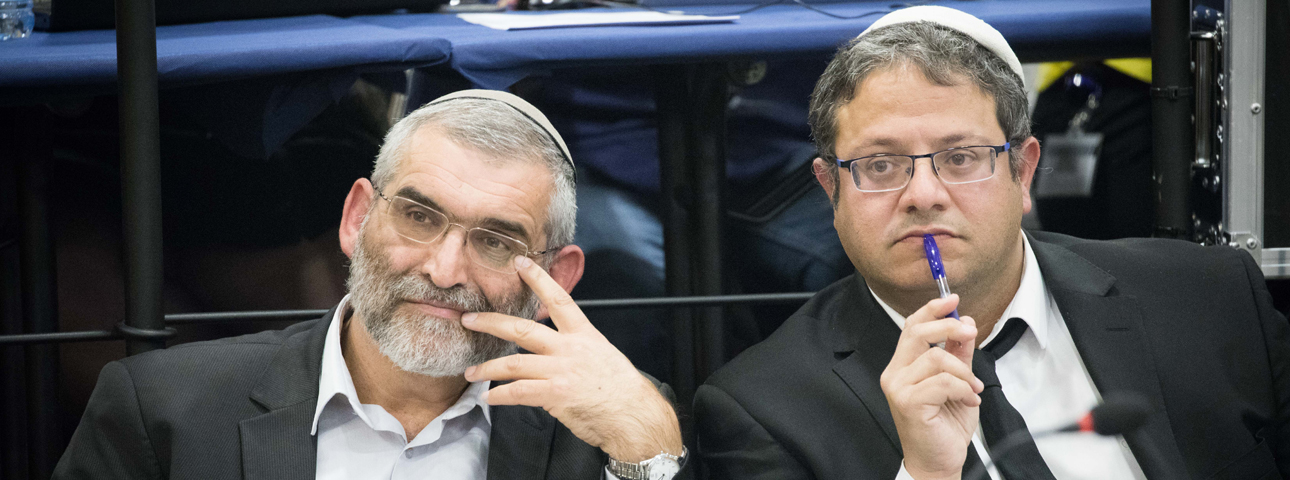Take Great Care When You Limit Freedom of Expression
Instead of training rhetorical cannons on the court, which is doing its job in a chaotic situation, the legislature should delete Section 7A from the Basic Law. Let everyone run for the Knesset, and let those who violate criminal laws bear the consequences of their actions

Michael Ben Ari and Itamar Ben Gvir | Flash 90
Would you let one soccer team decide for its opponent – which players can take the field, in an upcoming match? The very question is absurd, because the conflict of interest reeks to high heaven. But this is precisely the situation of our Central Elections Committee (CEC), which rules on the disqualification of Knesset candidates and lists. Its members represent the factions in the outgoing Knesset, with a majority from the current coalition. This means that the coalition can vote en bloc to decide who cannot run against it in the next election. It would be funny if it weren’t so sad.
Political interests and surging populism seduce the politicized majority on the CEC to muffle sectors of the Israeli marketplace of ideas. It does this by invoking Article 7A of the Basic Law: The Knesset, which defines grounds for disqualification that can be given a very broad interpretation: negating the existence of the State of Israel as a Jewish and democratic state. As we all know, the terms “Jewish state” and “democratic state” are somewhat amorphous, leaving a vast opening to bar candidates and lists of various stripes. Today the target is the Arabs (most of whom reject the stipulation that Israel is the nation-state of the Jewish people); tomorrow, if some sectors are brazen enough, it will be the turn of the ultra-Orthodox (whose commitment to democracy, in its substantive sense that includes the principle of equality, is far from clear).
The disqualification of a candidate or list comes very close to a lethal blow to basic constitutional rights—political equality, freedom of expression, freedom of association, the right to vote, and of course the right to be elected. Because the core of democracy itself is liable to be damaged by abuse of the power allotted to the CEC, there is a need for an apolitical body to review the Committee’s use of its draconian power. Accordingly, the Basic Law adds that a decision by the CEC to approve or disqualify a candidate or list is subject to ratification by the Supreme Court. This is meant to guarantee that the cat is not the sole guardian of the cream.
This brief explanation makes plain the absurdity of the claims advanced by some, such as our Minister of Justice, that the court’s decision this week is “crass interference in the core of Israeli democracy” and that the High Court’s decision has turned it into a “political actor.” Does the honorable minister expect that the High Court will automatically approve every decision by a politicized committee that has an intrinsic conflict of interest?
Minister Shaked really needs to sit down and study the remark by former Supreme Court president Asher Grunis, one of the most conservative justices of recent decades and almost the antithesis of Aharon Barak, who championed proactive judiciary. In 2013, when the Supreme Court overturned the disqualification of Arab MK Hanin Zouabi, he wrote as follows: “The confirmation proceedings that take place before the Supreme Court are not just a matter of review, meant to monitor the lawfulness of the Central Elections Committee’s decision. It is an independent proceeding in which the court has the authority, which does not depend on the decision by the Central Elections Committee, to examine whether or not it is appropriate to ratify the decision.”
The results of the ritual of striking candidates off the ballot, repeated in every election campaign, are known in advance: the politicians who are up for reelection in a few weeks are seduced to wield their power to approve or reject candidates so as to win favor from the members of their camp, whether left or right. The stew cooked in the political kitchen is then served to the Supreme Court, which is compelled to intervene, whether it wishes to or not. The only true beneficiaries are the populists who incite against the judicial branch.
This does not mean that we must agree with every decision issued by the court. The question of the appropriate way for a democracy to defend itself against antidemocratic individuals and ideas poses a very real dilemma. As I see it, Israeli democracy would survive Michael Ben-Ari’s presence in the Knesset. One cannot go too far in condemning his racist positions and it is impossible to accept his ridiculous explanations for his blatant incitement against Arabs simply because they are Arabs. But even though he is a racist, and the Basic Law states that incitement to racism constitutes grounds for disqualification, I believe that the section should be interpreted narrowly and applied only to incitement that raises a near-certainty of actual harm to individuals. That is, the general legal standards for limiting freedom of expression of every individual according to Israeli law should be applied equally to those who want to be elected to the Knesset.
In a better world, instead of training rhetorical cannons on the court, which is doing its job in a chaotic situation, the legislature should delete Section 7A from the Basic Law. Let everyone run for the Knesset, and let those who violate criminal laws bear the consequences of their actions.
